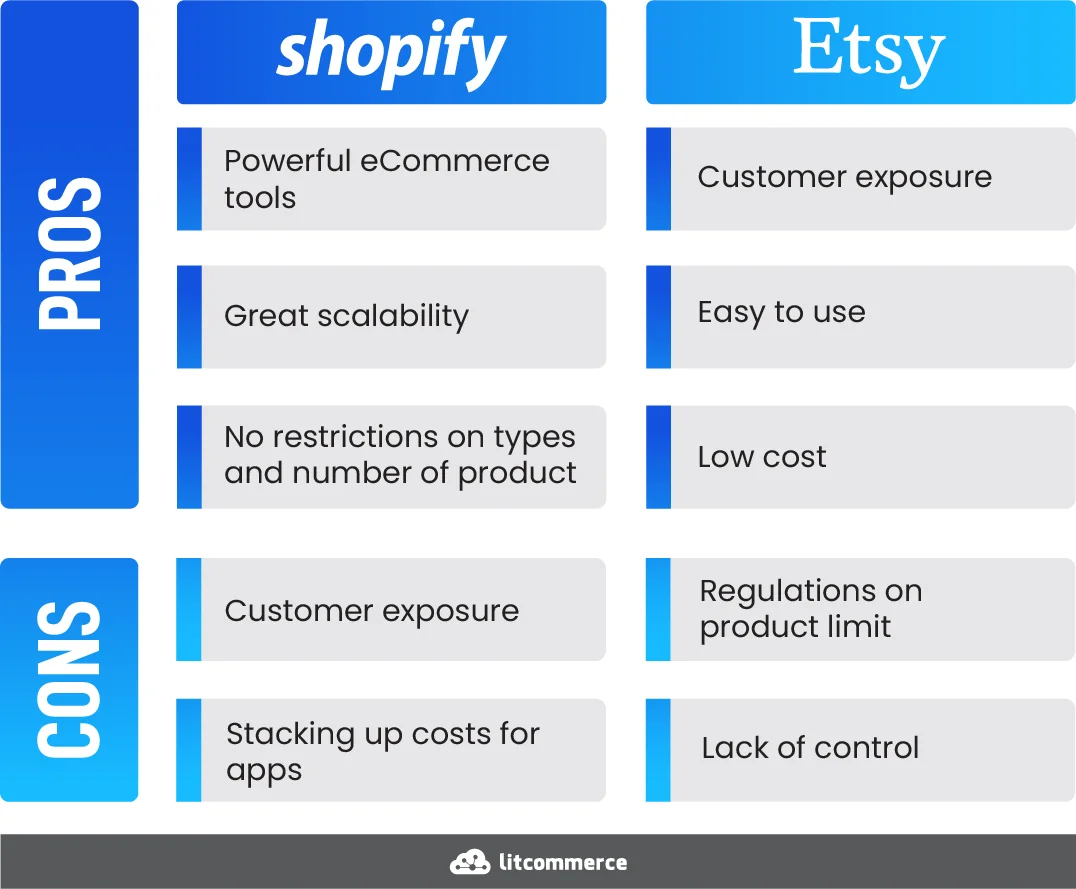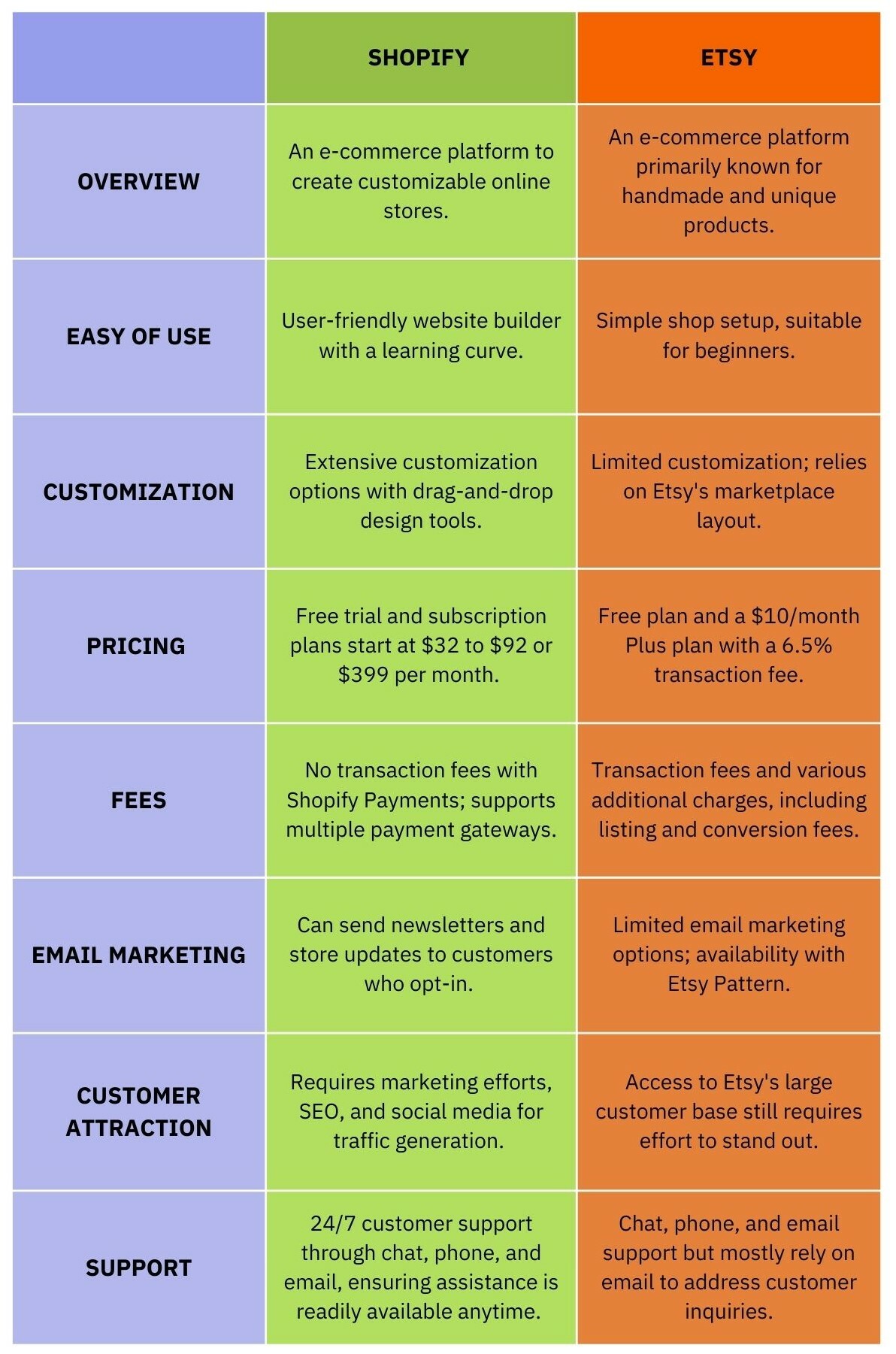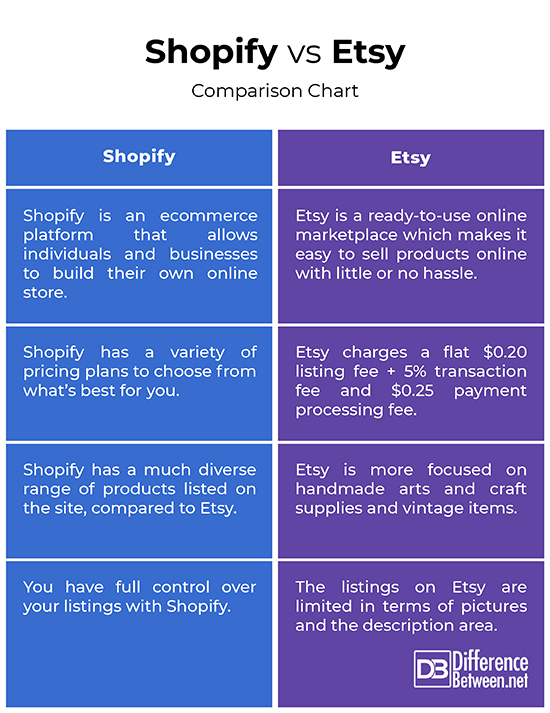Shopify is a customizable e-commerce platform for independent stores. Etsy is a marketplace for handmade and vintage items.
Shopify and Etsy cater to different types of sellers and business models. Shopify offers a robust e-commerce solution for businesses wanting full control over their online store. It provides extensive customization options, including themes, plugins, and the ability to use a unique domain name.
Shopify is ideal for businesses aiming to build a standalone brand. Etsy, on the other hand, focuses on a niche market of handmade, vintage, and unique items. Sellers benefit from Etsy’s established marketplace, which attracts buyers specifically looking for unique products. This makes Etsy a great choice for artisans and small-scale sellers who prefer a ready-made audience.

Credit: litcommerce.com
Platform Overview
Choosing the right e-commerce platform is crucial. Shopify and Etsy are popular choices. Each has unique features and benefits. Understanding them helps you decide which suits your needs better.
What Is Shopify?
Shopify is a versatile e-commerce platform. It allows you to create an online store. You can customize your store to match your brand. Shopify supports various payment gateways. It offers tools for inventory management. You can also use marketing tools to boost sales.
Shopify is suitable for all business sizes. It is ideal for entrepreneurs who want full control. The platform is user-friendly and scalable. You can start small and grow big.
What Is Etsy?
Etsy is a marketplace for handmade and vintage items. It connects sellers with buyers looking for unique products. Etsy has a built-in audience of buyers. It is great for artists and crafters. The platform is easy to use and set up. Etsy handles the technical side for you.
Etsy charges listing fees and transaction fees. It offers limited customization options. Sellers focus on creating unique products. Etsy manages the marketplace environment.
| Feature | Shopify | Etsy |
|---|---|---|
| Target Audience | All Business Sizes | Handmade & Vintage Items |
| Customization | High | Low |
| Fees | Monthly Subscription | Listing & Transaction Fees |
| Control | Full Control | Limited Control |
| Scalability | Highly Scalable | Less Scalable |

Credit: www.alphaservesp.com
Ease Of Use
Understanding the Ease of Use can help you choose between Shopify and Etsy. Both platforms offer different experiences based on your needs. Let’s break down their ease of use by looking at their User Interface and Setup Process.
User Interface
The User Interface is crucial for a smooth experience. Shopify has a clean and intuitive dashboard. You can navigate easily through the options. It uses a sidebar menu for quick access to features.
Etsy’s interface is also user-friendly. It is designed for simplicity. The main focus is on listing products quickly. Navigation is straightforward, making it easy for new users.
| Aspect | Shopify | Etsy |
|---|---|---|
| Navigation | Sidebar Menu | Top Menu |
| Dashboard | Customizable | Simple |
| Learning Curve | Moderate | Low |
Setup Process
Setting up your store on Shopify is straightforward. You start with a 14-day free trial. This lets you explore features before committing.
- Sign up with your email
- Choose a theme
- Add products
- Set up payment options
- Launch your store
The setup process on Etsy is even simpler. You can get started in minutes.
- Create an account
- Set up your shop name
- List your products
- Choose your payment method
- Open your shop
Both platforms offer a smooth onboarding process. Shopify provides more customization. Etsy focuses on quick setup and ease of use.
Customization Options
If you’re deciding between Shopify and Etsy for your online store, understanding customization options is crucial. Both platforms offer unique features, but they differ significantly in customization capabilities. Let’s dive into the specifics of design flexibility and template availability for each platform.
Design Flexibility
Shopify excels in design flexibility. It allows users to fully customize their online store’s appearance. You can modify the code, add custom HTML, and change CSS. This level of customization is ideal for those with coding knowledge or access to a developer.
Etsy, on the other hand, offers limited design flexibility. Sellers can only modify certain elements like banner images and shop icons. There is no access to the underlying code. This makes it easier for beginners but limits advanced customization.
Template Availability
Shopify provides a wide range of templates. Users can choose from over 70 professional themes. Many themes are free, but some premium options require a purchase. The themes are responsive and suitable for different types of businesses.
Etsy doesn’t offer traditional templates. Instead, it provides a standardized shop layout. Sellers can tweak minor design aspects within this layout. This simplicity can be beneficial for those who prefer a straightforward setup.
| Feature | Shopify | Etsy |
|---|---|---|
| Design Flexibility | High | Low |
| Template Availability | Over 70 themes | Standardized layout |
In summary, Shopify offers extensive customization options suitable for advanced users. Etsy provides a simpler, more beginner-friendly approach. Choose the platform that best matches your needs.

Credit: www.differencebetween.net
Cost Comparison
Understanding the cost differences between Shopify and Etsy is crucial. It helps you decide which platform suits your budget and business needs. Let’s break down the costs involved.
Subscription Fees
Shopify offers various plans to accommodate different business sizes. Their basic plan starts at $29 per month. They also provide a mid-tier plan at $79 per month and an advanced plan at $299 per month.
Etsy, on the other hand, charges no monthly subscription for its basic plan. If you want more features, you can opt for Etsy Plus at $10 per month.
Here’s a quick comparison:
| Platform | Basic Plan | Mid-Tier Plan | Advanced Plan |
|---|---|---|---|
| Shopify | $29/month | $79/month | $299/month |
| Etsy | Free | $10/month (Etsy Plus) | N/A |
Transaction Fees
Transaction fees differ between Shopify and Etsy as well. Shopify charges a 2.9% + 30¢ fee per transaction for its basic plan. For the mid-tier plan, the fee is 2.6% + 30¢. The advanced plan charges a 2.4% + 30¢ fee per transaction.
Etsy has a more straightforward fee structure. They charge a 5% transaction fee on the sale price. There’s also a 3% + 25¢ payment processing fee per transaction.
Here’s a detailed look:
| Platform | Transaction Fee | Payment Processing Fee |
|---|---|---|
| Shopify Basic | 2.9% + 30¢ | Included |
| Shopify Mid-Tier | 2.6% + 30¢ | Included |
| Shopify Advanced | 2.4% + 30¢ | Included |
| Etsy | 5% | 3% + 25¢ |
Choosing between Shopify and Etsy depends on your budget and business goals. Consider both subscription and transaction fees to make an informed decision.
Market Reach
Understanding the market reach of Shopify and Etsy is crucial for any seller. Each platform offers unique opportunities to connect with potential customers. This section explores how Shopify and Etsy differ in their market reach.
Customer Base
Shopify and Etsy cater to different types of customers. Shopify users build their own online stores, attracting a unique customer base. These customers are looking for brand-specific experiences. Shopify sellers have more control over their brand identity and customer interactions.
Etsy attracts customers who enjoy browsing a marketplace. People visit Etsy to find handmade, vintage, and unique items. The platform already has a large, built-in audience. This means new sellers can tap into existing traffic without extensive marketing efforts.
Marketing Tools
Both Shopify and Etsy offer various marketing tools, but they differ significantly. Shopify provides extensive options for marketing integration. Sellers can use SEO tools, email marketing, and social media integrations. Shopify also allows for Google Analytics integration, enabling detailed tracking of customer behavior.
Etsy, on the other hand, offers more limited marketing tools. Sellers can utilize Etsy Ads to promote their listings within the platform. Etsy’s built-in audience helps with visibility, but there are fewer customization options. Etsy’s marketing tools focus more on internal promotions rather than external integrations.
| Aspect | Shopify | Etsy |
|---|---|---|
| Customer Base | Brand-specific, targeted | Marketplace, broader audience |
| Marketing Tools | Comprehensive, external integrations | Limited, internal promotions |
Features And Tools
Choosing between Shopify and Etsy depends on your needs. Both platforms offer unique features and tools to help you sell online. This section will dive into some key differences in their features and tools.
Inventory Management
Shopify offers robust inventory management tools. You can easily track stock, set up alerts for low inventory, and manage multiple product variants. Shopify’s system integrates well with third-party apps, making it easy to expand your capabilities.
Etsy has simpler inventory management. It is designed for small-scale sellers. You can list products, but tracking is basic. It suits sellers with a small number of items.
| Feature | Shopify | Etsy |
|---|---|---|
| Stock Tracking | Advanced | Basic |
| Alerts | Low Stock Alerts | No Alerts |
| Product Variants | Multiple Variants | Limited Variants |
Payment Gateways
Shopify supports over 100 payment gateways. This includes PayPal, Stripe, and Shopify Payments. You can accept payments from all over the world. This flexibility helps in reaching a global audience.
Etsy has fewer options. It primarily uses Etsy Payments. This integrates with PayPal and some credit cards. It is straightforward but less flexible compared to Shopify.
| Feature | Shopify | Etsy |
|---|---|---|
| Payment Options | Over 100 Gateways | Limited Options |
| Global Payments | Yes | Yes |
| Flexibility | High | Low |
Understanding these differences can help you choose the right platform. Shopify offers more advanced tools. Etsy is simpler and easier for beginners.
Pros And Cons
Understanding the pros and cons of Shopify and Etsy can help you choose the right platform. This section will break down the advantages and disadvantages of each platform. Let’s dive into the specifics.
Advantages Of Shopify
Shopify offers a range of benefits that make it a powerful e-commerce platform. Here are some key advantages:
- Customizable Storefront: Shopify allows you to fully customize your online store.
- Scalability: It can handle growth from small to large businesses.
- Wide Range of Apps: Shopify’s app store features numerous tools for marketing, sales, and inventory.
- Secure Payment Options: It offers multiple secure payment gateways.
- SEO-Friendly: Shopify provides built-in SEO features to improve search engine rankings.
Advantages Of Etsy
Etsy is a popular marketplace that offers several advantages, especially for small-scale sellers. Here are some advantages:
- Easy Setup: Etsy is simple to set up and start selling quickly.
- Built-In Audience: Etsy has a large, built-in audience of buyers.
- Low Initial Costs: Listing fees are low, making it affordable for new sellers.
- Focused Niche: Etsy is known for handmade, vintage, and unique items.
- Community Support: Etsy offers a strong community of sellers for support and advice.
Pros And Cons Table
| Feature | Shopify | Etsy |
|---|---|---|
| Customization | High | Low |
| Scalability | Excellent | Limited |
| Initial Costs | Higher | Lower |
| Audience | Varied | Focused |
| Setup Time | Moderate | Quick |
Best Fit Scenarios
Choosing between Shopify and Etsy can be challenging. Both platforms offer unique benefits. Your choice depends on your specific needs. Let’s explore which platform suits different business scenarios.
When To Choose Shopify
Shopify is ideal for those who want full control over their online store. It’s perfect for businesses wanting to build a unique brand. Here are some scenarios where Shopify excels:
- Customization: Need a highly customizable online store? Shopify is the answer.
- Scalability: Planning to scale your business? Shopify offers advanced features.
- Branding: Want to establish a strong brand identity? Shopify allows you to create a unique look.
| Feature | Benefit |
|---|---|
| Custom Themes | Create a personalized online store. |
| SEO Tools | Improve your store’s search engine ranking. |
| App Integrations | Integrate with various third-party apps. |
When To Choose Etsy
Etsy is best for those selling handmade or vintage items. It’s a marketplace with a built-in audience. Here are scenarios where Etsy shines:
- Handmade Products: Selling crafts or handmade goods? Etsy is the place.
- Low Startup Cost: Don’t want to invest much initially? Etsy is budget-friendly.
- Market Exposure: Want instant access to buyers? Etsy offers a large customer base.
| Feature | Benefit |
|---|---|
| Built-in Traffic | Reach millions of potential buyers. |
| Low Fees | Start selling with minimal costs. |
| Simple Setup | Easy and quick to set up a store. |
Frequently Asked Questions
Is Etsy Cheaper Than Shopify?
Etsy generally has lower upfront costs compared to Shopify. Etsy charges listing fees and transaction fees. Shopify has monthly subscription fees, but offers more customization and control.
Should I Have An Etsy And Shopify?
Yes, having both Etsy and Shopify can expand your reach. Etsy offers a marketplace with built-in traffic, while Shopify provides customizable store options. This combination can maximize your online sales potential.
What Are The Advantages Of Shopify Over Etsy?
Shopify offers complete control over branding and design, supports unlimited products, and provides extensive app integrations. It also has robust SEO tools and better scalability.
Why Are People Moving From Etsy To Shopify?
People move from Etsy to Shopify for greater control over their store, lower fees, and better customization options. Shopify offers advanced features and scalability, making it ideal for growing businesses. Enhanced marketing tools and branding capabilities attract entrepreneurs seeking more independence and flexibility.
Conclusion
Choosing between Shopify and Etsy depends on your business needs. Shopify offers customization and control, ideal for larger stores. Etsy is great for handmade and vintage sellers seeking a marketplace. Evaluate your goals and resources to decide. Both platforms can help you succeed in online selling, but each caters to different seller types.